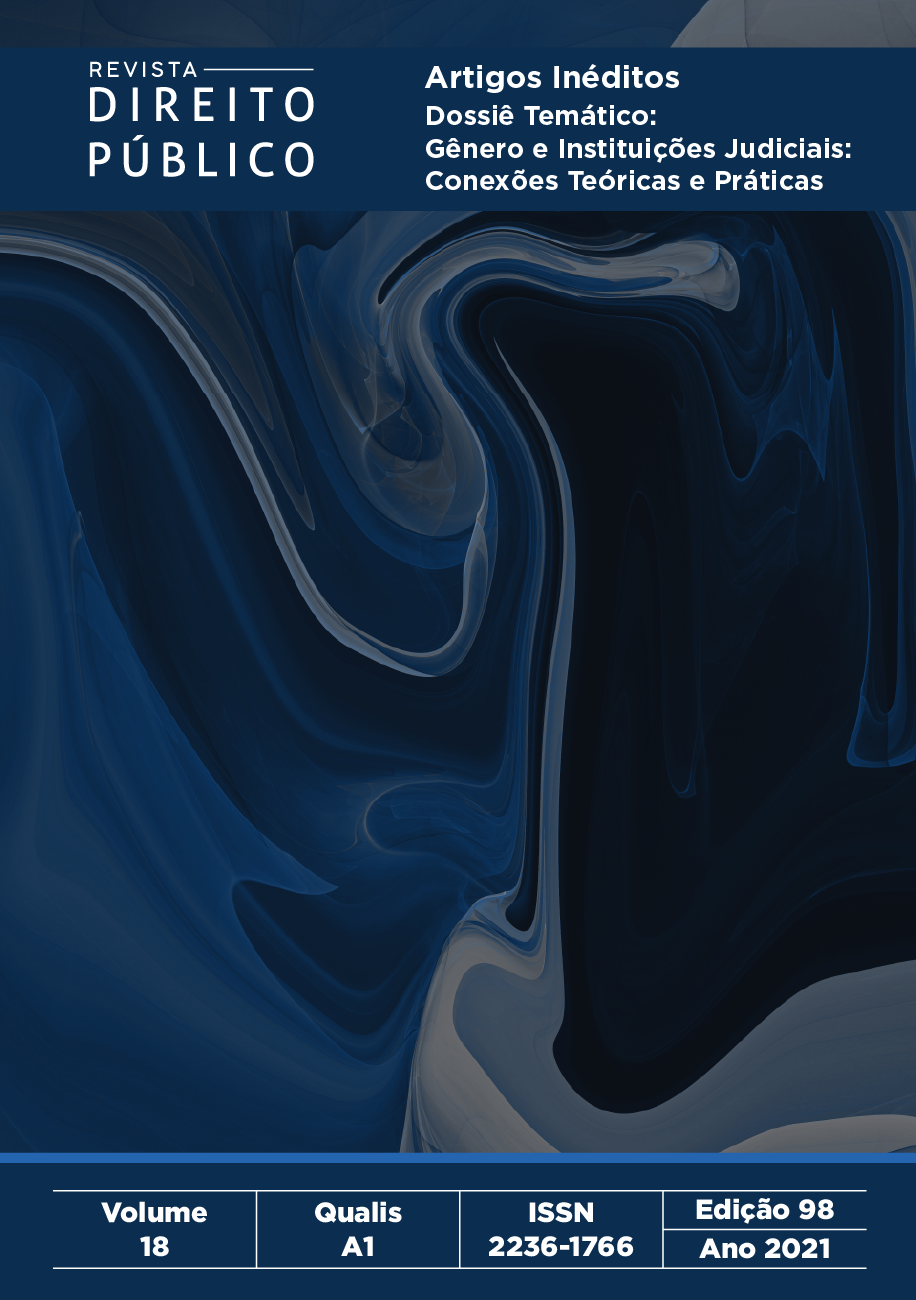A European Constitutional and Public Law Scholar
DOI:
https://doi.org/10.11117/rdp.v18i98.5851Resumo
A European Constitutional and Public Law ScholarDownloads
Referências
ALEXY, R. (2010). Theory of constitutional rights (p. 163). Oxford, UK: Oxford University Press.
AMARAL, R. C. (2004). Peter Häberle e a Hermenêutica Constitucional. (trans., Peter Häberle and Constitutional Hermeneutics). Porto Alegre: Sergio Antonio Fabris Editor. Azpitarte Sánchez, M. (2003). Apuntes Sobre el Pensamiento de Peter Häberle (Notes on the Thought of Peter Häberle). Journal of the Law School of the University of Granada 6, 345-364.
BLANKENAGEL, A., PERNICE, I., & SCHULZE-FIELITZ, H. (Eds.). (2004).
Verfassung im Diskurs der Welt: Liber Amicorum für Peter Häberle (Constitution in the discourse of the world: liber amicorum for Peter Häberle). Tübingen: Mohr Siebeck.
CALLEJÓN, F. B. (Ed.). (2004). Derecho Constitucional y Cultura (trans.,
Constitutional Law and Culture). Madrid: Editorial Tecnos.
CAMERA dei deputati. (2007). The constitution of the Italian Republic. Roma: Segreteria generale.
COLLINGS, J. (2015). Democracy’s guardians: A history of the German federal constitutional court, 1951-2001 (p. 96). Oxford, UK: Oxford University Press.
DEV, A. N. (1946). Socialism and the national revolution. Bombay: Padma
Publications.
______ . (1956). Baudh Dharma Darshana (in Hindi). Patna: Motilal Banarsidass.
Gandhi, M. K. (2011). Trusteeship. Ahmedabad: Navjeevan Trust.
HÄBERLE, P. (1990-1991). Current problems of German federalism (pp. 79-119).
University of Rome II. Rome: Department of Public Law Yearbook.
______ . (1994). Constitutional developments in Eastern Europe – From the point of view of the legal philosophy and the constitutional theory. In M. Troper (Ed.), L’etat de droit (Cahiers de Philosophie Politique et Juridique) (Vol. 24, pp. 127-157)
(trans., The Rule of Law). Paris: Presses Universitaires de Caen.
______ (2000). The constitutional state and its reform requirements. Ratio Juris, 13(1), 77-94.
______. (2001). Per una dottrina della costituzione come scienza della cultura (edizione italiana a cura di Jörg Luther) (For a Doctrine of the Constitution as a Science of Culture; Italian edition, trans. and edited by Jörg Luther). Roma: Carocci.
______ . (2006a). Legal comparison for constitutional development: The relevance of federalism and regionalism. In J. Luther, P. Passaglia, & R. Tarchi (Eds.), A world of second chambers (pp. 47-61). Milano: Giuffrѐ.
HÄBERLE, P. (2006b). Function and significance of the constitutional courts in a comparative perspective. In I. Pernice J. Kokott, C. Saunders (Eds.), The future of the European judicial system in a comparative perspective (pp. 65-75). BadenBaden: Nomos.
______ . (2007). The German university cannot die – A thesis paper from the province. Stellenbosch Law Review, 1, 3-5.
______ . (2014). Ein portrait: Album 1934-2014 (A Portrait: Album 1934-2014). Pamplona: Thomson Reuters Aranzadi.
HATAJIRI, I. (2004). Eine Studie über die Verfassungslehre von P. Häberle und ihre Rezeption in Japan (A study on the Constitutional Theory of Peter Häberle and his reception in Japan). In T. Yamashita (Ed.), Festschrift (pp. 143-175). Tokyo.
HOFFMANN, F. (2003). Book review – Häberle and the world of the constitutional state. GLJ, 4(1), 1.
KHALID, H. (2015). In search of Shiva: A study of folk religious practices in
Pakistan. Delhi: Rupa.
KOMMERS, D. P., & MILLER, R. A. (2012). The constitutional jurisprudence of the Federal Republic of Germany (3rd rev. ed., p. 33). Durham and London, UK: Duke University Press.
KOTZUR, M. (Ed.). (2018). Peter Häberle on constitutional theory: Constitution as culture and the open society of constitutional interpreters. Baden-Baden: Nomos.
LUTHER, J. (2002). La scienza Häberliana delle costituzioni [The Häberlean science of constitutions, in Italian]. In P. Comanducci & R. Guastini (Eds.), Analisi e Diritto 2001 Ricerche di Giurisprudenza Analitica (pp. 105-143). Turin: Giappichelli.
______ . (2014). Die Verfassungskultur des homo ridens (trans., The Constitutional Culture of Homo Ridens). In A. Blankenagel (Ed.), Den Verfassungsstaat nachdenken (trans., Thinking about the Constitutional State). Berlin: Duncker & Humblot.
MISHRA, Y. (1962). An early history of Vaishali. Patna: Motilal Banarsidass.
MORLOK, M. (Ed.). (2001). Die Welt des Verfassungsstaates (trans., The World of the Constitutional State). Baden-Baden: Nomos.
NIKAM, N. A., & Mckeon, R. (Ed. and trans.). (1959). The edicts of Asoka (p. 31). Chicago, IL: University of Chicago Press.
PAREKH, B. (2015). Debating India (pp. 36–41). Oxford, UK: Oxford University Press.
POSAVEC, Z. (2002). Teorija ustavne države Petera Häberlea (trans.,
The Constitutional Theory of Peter Häberle and the Constitutional States).
In Ustavna države (p. 279).
ROY, E. A. (2017, March 16). New Zealand river granted same legal rights as human being. The Guardian. Retrieved from ttps://www.theguardian.com/ world/2017/mar/16/new-zealand-river-granted-same-legal-rights-as-human-being
SEGADO, F. F. (2003). La Garantia del Contenido Esencial de los Derechos Fundamentales. (The Guarantee of Essential Content of Fundamental Rights) Madrid: Dykinson.
SEN, A. (2001). Development as freedom. Oxford, UK: Oxford University Press.
______. (2010). The idea of justice. London, UK: Penguin.
______ . (2017). Collective choice and social welfare. London, UK: Penguin.
SINGH, K. (1992, August 22). Obituary: Achut Patwardhan. The Independent. Retrieved from https://www.independent.co.uk/news/people/obituary-achyutpatwardhan-1541827.html
SINGH, M. P. (2016). V.N. Shukla’s constitution of India (12th ed., pp. 387-388). Lucknow: Eastern Book Company.
SINGH, M. P., & SHUKLA, V. N. (2016). Constitution of India (12th ed., p. 209). Lucknow: Eastern Book Company.
SINHA, B. (2017, July 7). SC puts on hold Uttarakhand HC order declaring
river Ganga a living entity. The Hindustan Times. Retrieved from https://www. hindustantimes.com/india-news/sc-puts-on-hold-uttarakhand-high-court-orderdeclaring-ganga-a-living-entity/story-IYqkaehoLhAyWfjAP8GYOO.html
VALADÉS, D. (Ed.). (2006). Conversaciones Académicas Con Peter Häberle (trans., Academic Conversations with Peter Häberle) (2. erweiterter Aufl. 2017). MexikoStadt: UNAM.
VAN OOYEN, R. Chr., & Möllers, M. H. W. (Eds.). (2016). VerfassungsKultur: Staat, Europa und pluralistische Gesellschaft bei Peter Häberle. (trans., Constitutional Culture: State, Europe and Pluralistic Society in Peter Häberle).
Baden-Baden: Nomos von Kim, H.-J. (1989). Dong-A Law Review, 9, 467-498.
VOSSKUHLE, A., & Wischmeyer, T. (2015). Der Jurist im Kontext. Peter Häberle zum 80. Geburtstag (The Jurist in Context. Peter Häberle on his 80th Birthday). In Jahrbuch des Öffentlichen Rechts der Gegenwart (Yearbook of Public Law Today)
(Vol. 63, pp. 401-428). Tübingen: Mohr Siebeck.
Downloads
Publicado
Como Citar
Edição
Seção
Licença
Copyright (c) 2021 Direito Público

Este trabalho está licenciado sob uma licença Creative Commons Attribution-NonCommercial 4.0 International License.
O(s)/A(s) autores(as) dos manuscritos submetidos concorda(m) com as regras a seguir:
1) Todos os autores e autoras participaram do trabalho, são responsáveis pelas ideias e conceitos nele emitidos e atestam sua conformidade com os princípios éticos exigidos.
2) Todos os autores e autoras concordam com a forma final do trabalho e em ceder os direitos para publicação nos canais de publicação da Escola de Direito do IDP.
3) Todos os autores e autoras informam que o manuscrito é de sua autoria e assumem a responsabilidade pelo trabalho, declarando que a obra a ser publicada não infringe quaisquer direitos de propriedade intelectual de terceiros.
3.1) Em caso de submissão simultânea, além da reprovação imediata do artigo e comunicação ao(s) respectivo(s) periódico(s), a Revista Direito Público se reserva o direito de não receber novas submissões de todos os autores implicados pelo prazo de 2 (dois) anos, contado a partir da data de ciência do fato.
4) Todos os autores e autoras autoriza(m) a edição de seu trabalho e cede(m) à Escola de Direito do IDP os direitos de autor para reproduzir, editar e publicar ou veicular o citado trabalho em qualquer forma midiática, resguardada a autoria, em particular sob forma digital, em arquivo eletrônico online na Internet, bem como armazená-los em seu repositório de acordo com o desenvolvimento do processo editorial. Esta concessão não terá caráter oneroso para a Escola de Direito do IDP, não havendo remuneração sob qualquer modalidade pela utilização do referido material, tendo este o caráter de colaboração científica.












